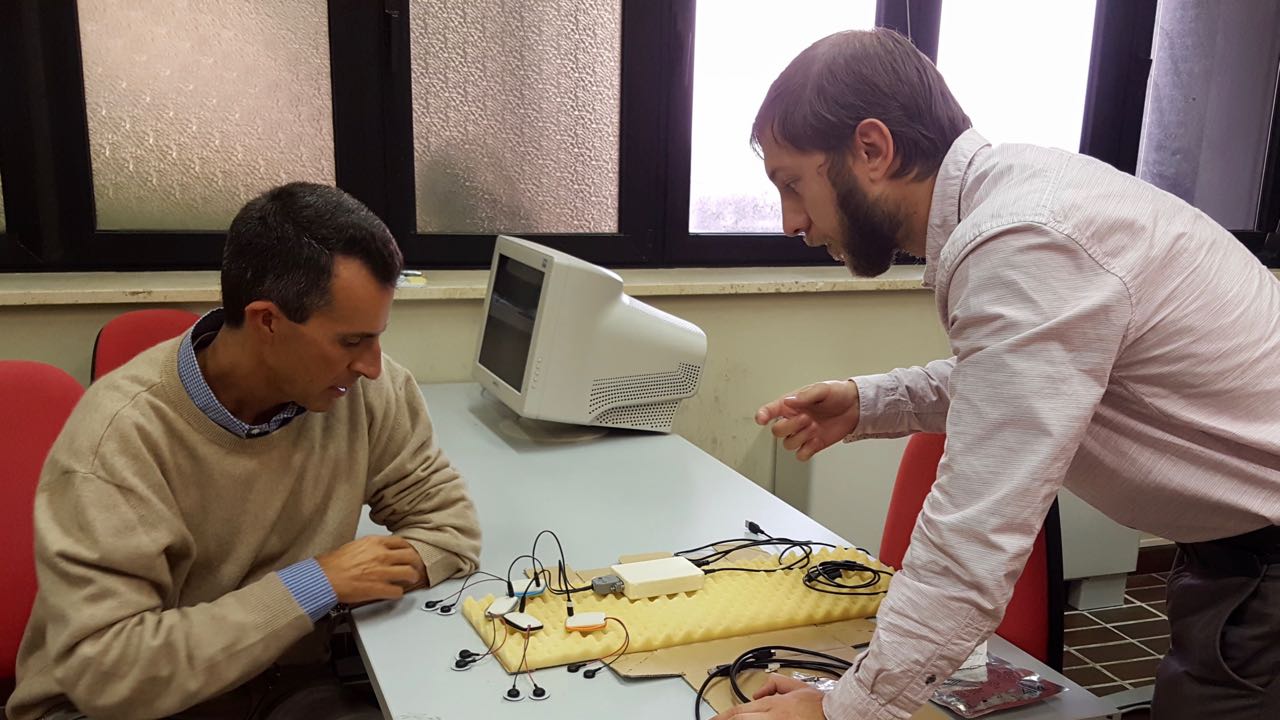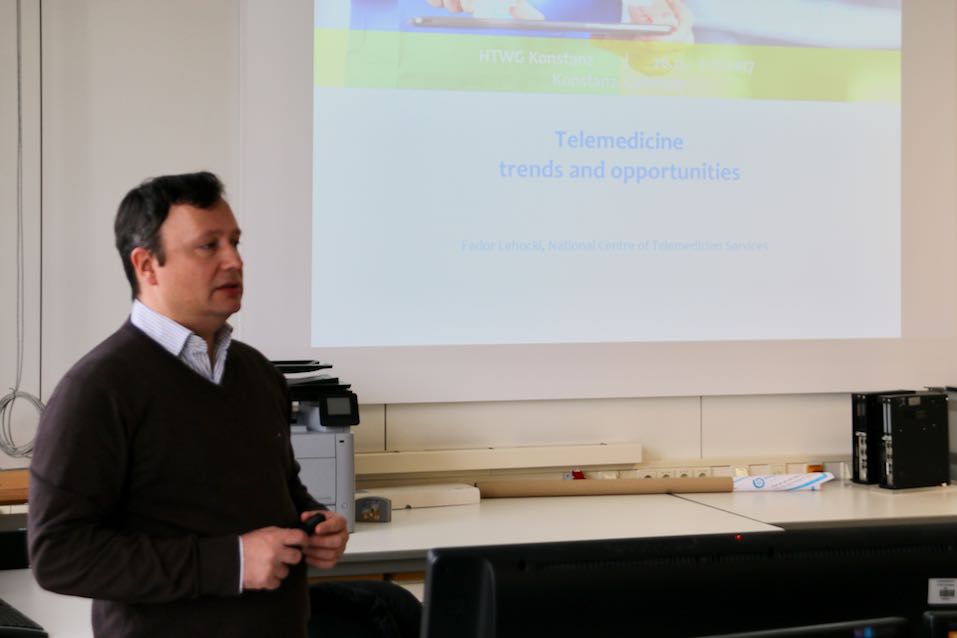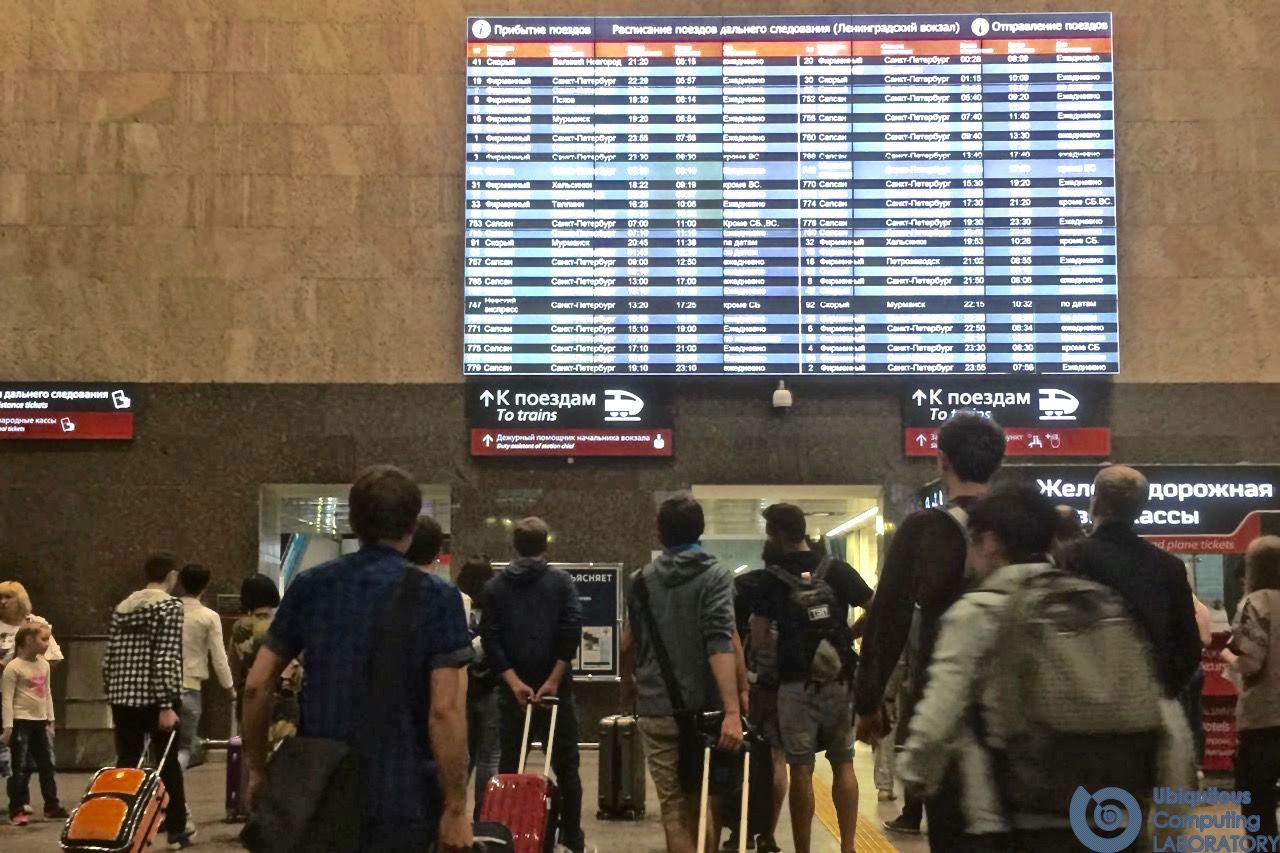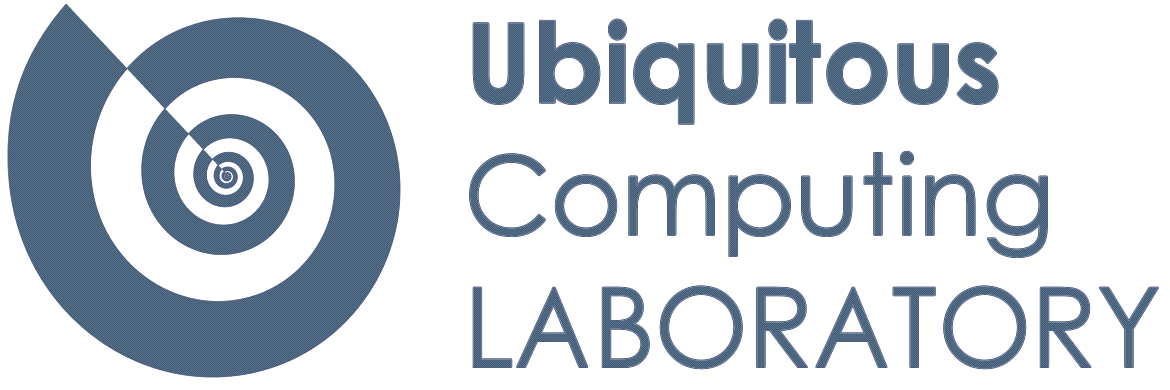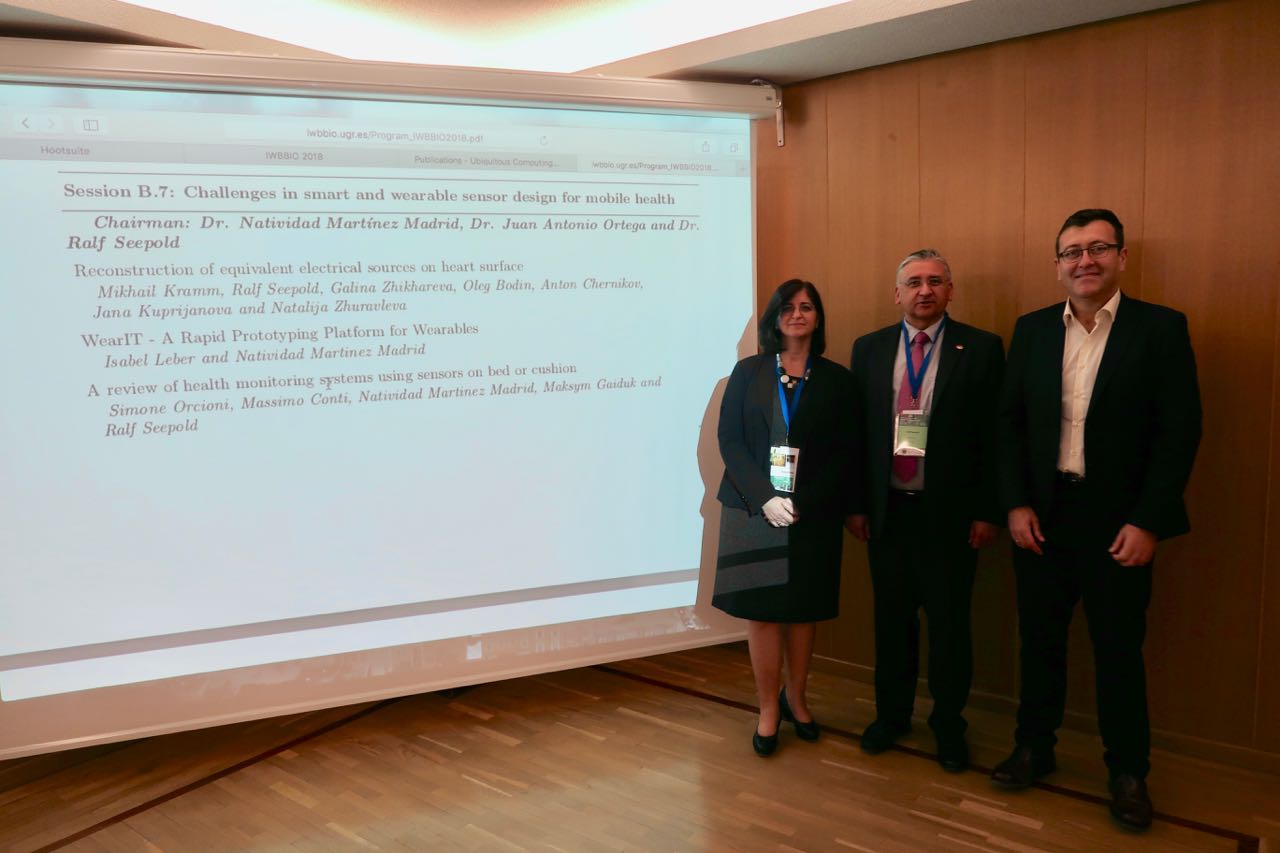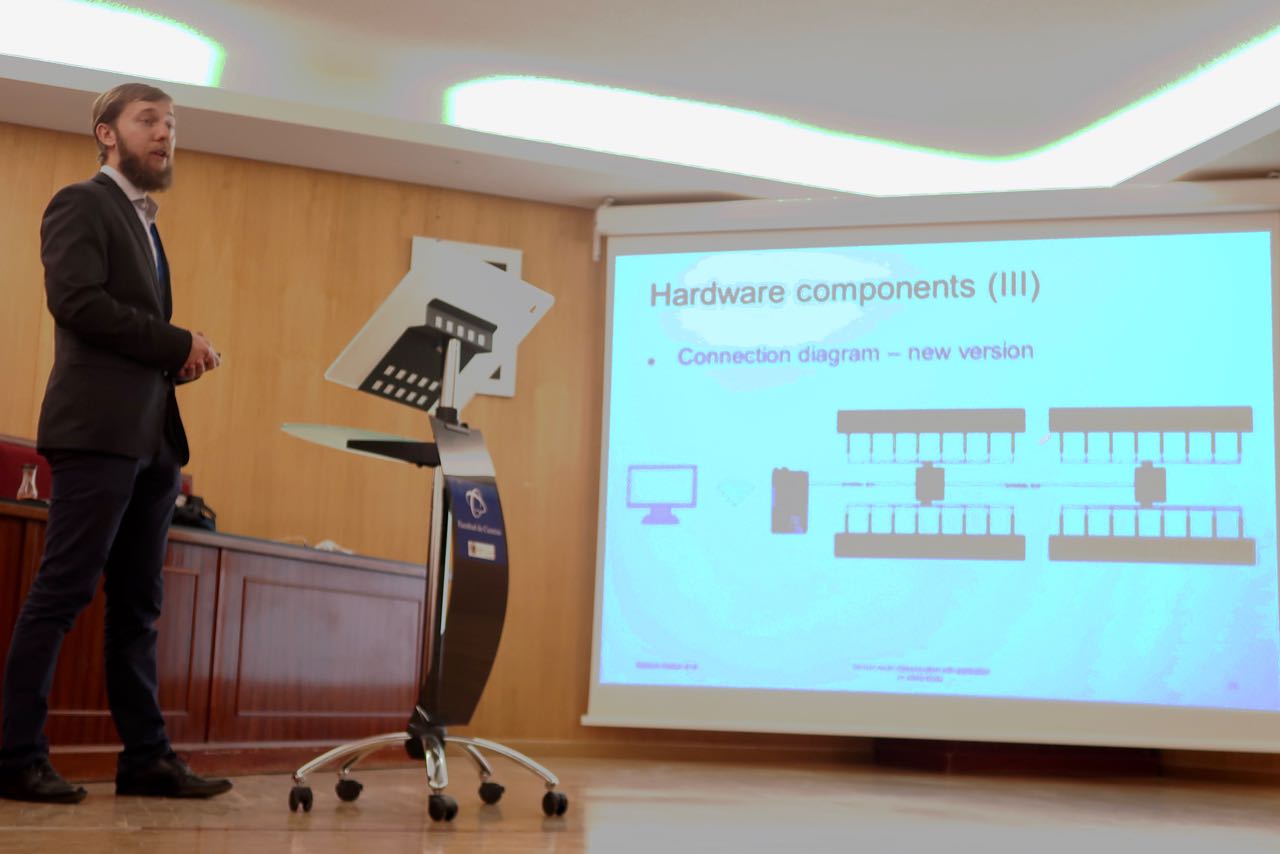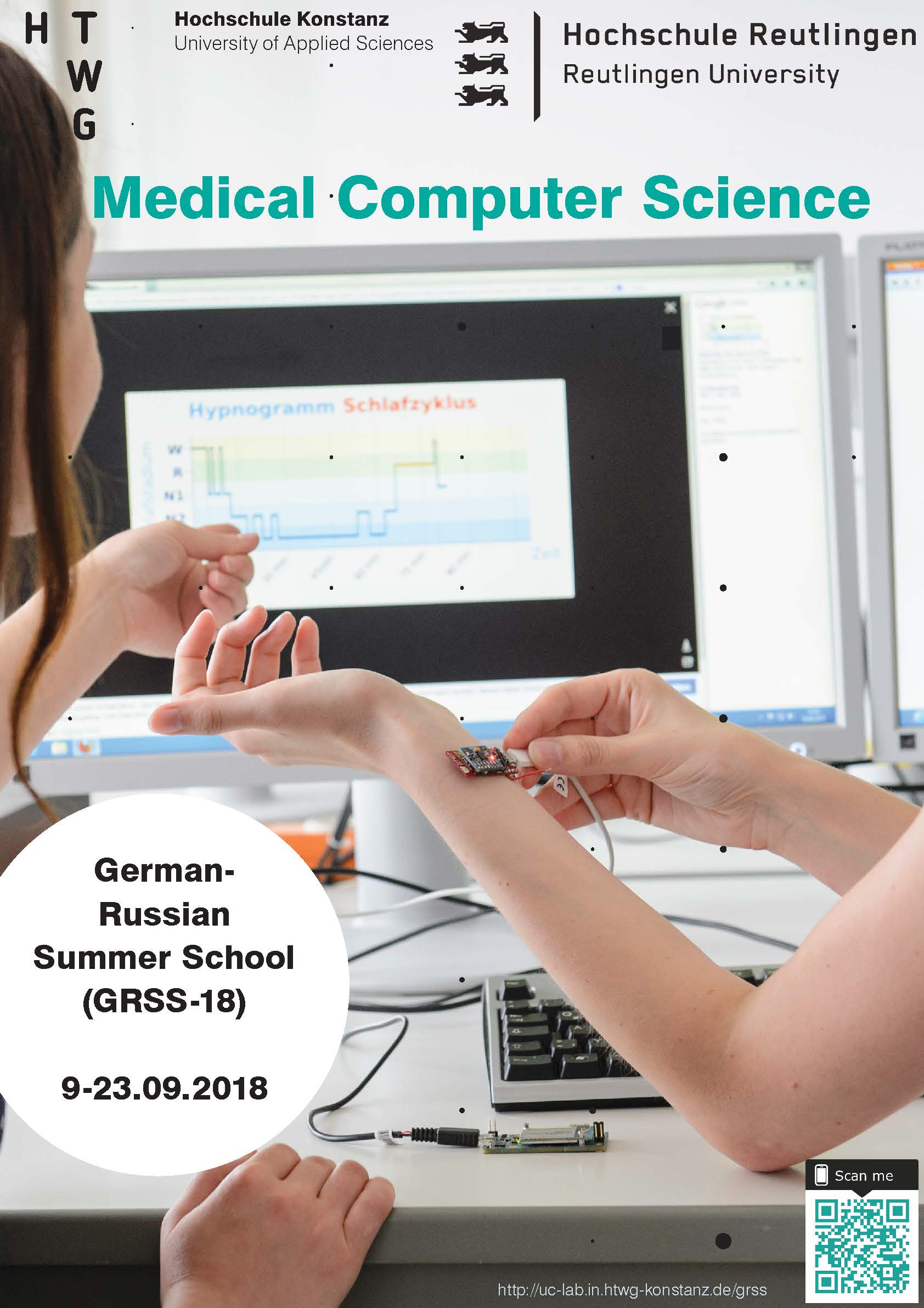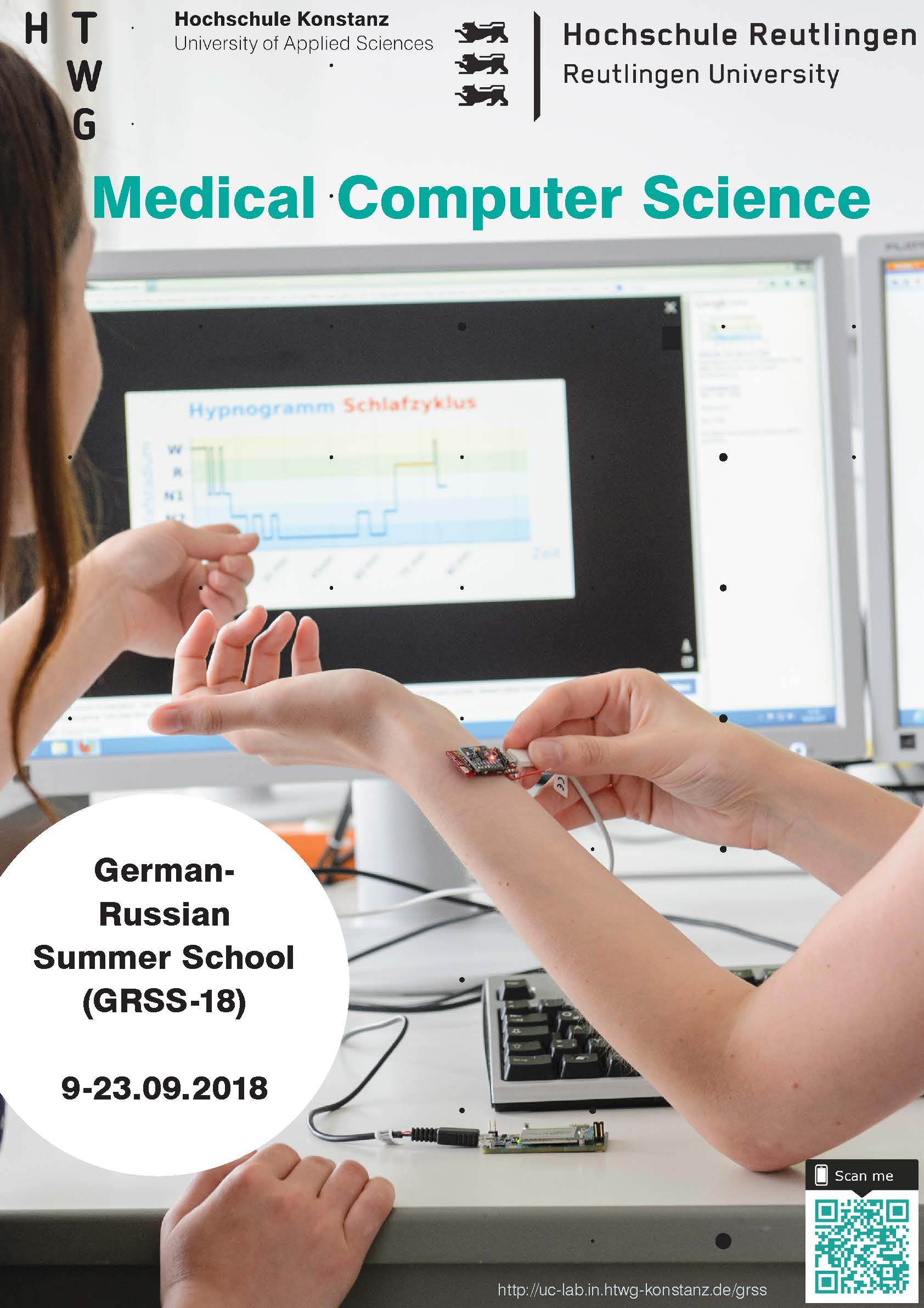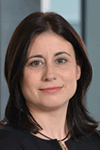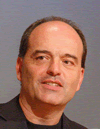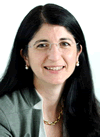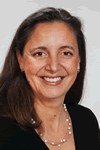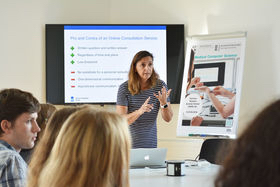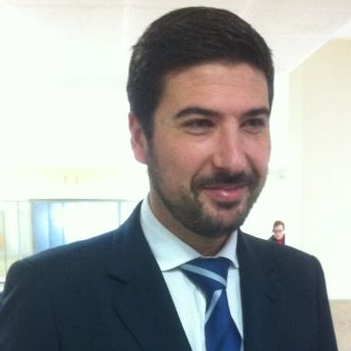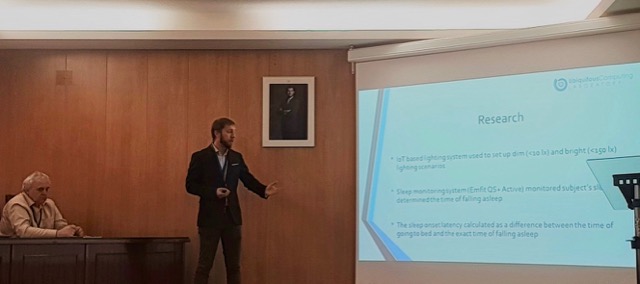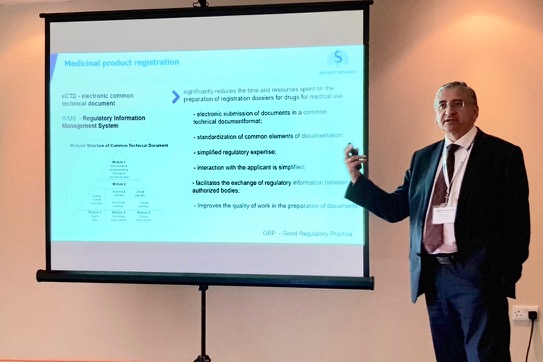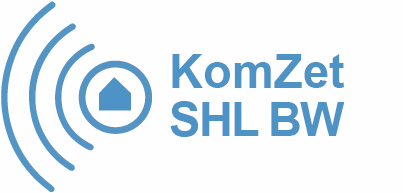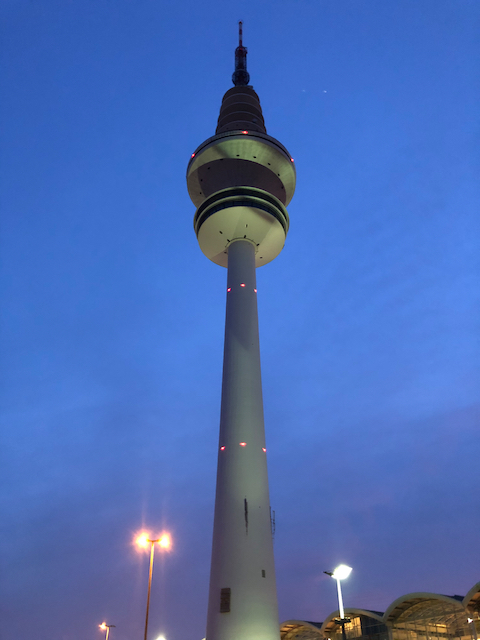![]()
German-Russian Summer School (GRSS-18) on Medical Computer Science
![GRSS Plakat small]()
Objetive and Main Goals
The purpose of the Summer School is to learn about Information and Internet Technology in the frame of Digital Medicine. The Summer School will show a wide spectrum of theory and applications of current and future trends in medical computer science, including telemedicine, data science, cognitive systems, VR/AR, computer assisted operation rooms, medical information systems, blockchain, biotechnology, etc. The participants will a enjoy a mixture of lectures, visits to laboratories and external institutions as well as hands-on practices.
Location
The Summer School will take place at the campus of HTWG Konstanz and Reutlingen University.
- Part 1: September 9-16, 2018 at Reutlingen University: Building 9, Room 9-005
- Part 2: September 16-23, 2018 at HTWG Konstanz: Building O, Room O-202
Program German-Russian Summer School 2018
(Single events may change on short notice. Please check the current version on this website).
Reutlingen University (10.-14.09.)
Monday 10.09.2018
|
Hours
|
Room
|
Activity
|
Responsible
|
|
10-11
|
9-005
|
Welcome to the Summer School in Reutlingen
Welcome from the Dean of the School of Informatics, Prof. Kloos
Presentation of the participants
Presentation of the School of Informatics
|
Prof. Martínez
Prof. Kloos
|
|
11-12
|
9-005
|
Session: Introduction to Internet of Things (IoT) and Telemedicine
|
Prof. Martínez
|
|
LUNCH
|
|
13-15
|
Several
|
Visits to IoT-Labs (AAL, SmartTextiles, Driving Simulator)
Visit to the Campus
|
Prof. Martínez
Th. Walzer (M.Sc.)
|
|
15-16
|
RIO
|
Visit to Reutlingen International Office (RIO)
Welcome from Prof. Veit, Director of RIO
|
Prof. Martínez
Prof. Veit
|
Tuesday 11.09.2018
|
Hours
|
Room
|
Activity
|
Responsible
|
|
10-11
|
9-005
|
Session: Introduction to Data Warehousing and Analytics
|
Prof. Petrov
|
|
11-12
|
DB-Lab
|
Visit to the Database-Lab
|
Prof. Petrov
|
|
LUNCH
|
|
13-14:30
|
9-005
|
Session: Steps towards the Intelligent Operating Room
Presentation of projects from the CaMed Research group (Computer Assisted Medicine)
|
Prof. Burgert
M. Wiemuth (M.Sc.)
|
|
14:30-15:30
|
MoCap-Lab
|
Session: Cognitive Systems
Visit to the Motion-Capture lab
|
Prof. Curio
S. Thalji (M.Sc.)
|
Wednesday 12.09.2018
|
Hours
|
Room
|
Activity
|
Responsible
|
|
10-11
|
9-005
|
Session: Medical Information Systems for Intersectoral Care
|
Prof. Thies
|
|
11-12
|
9-005
|
Session: Mobile Health Apps
|
Prof. Martínez
|
|
12-13
|
9-005
|
Session: Computer Graphics and VR/AR
|
Prof. Kloos
|
|
LUNCH
|
|
14-15
|
|
Session: Study Programs in Biomedical Sciences and the BioMed Student Project Laboratory
Visit to the Faculty of Applied Chemistry
|
Prof. Kemkemer
|
|
15-
|
9-005
|
Session: Baden-Württemberg Health Cloud Project
|
Dr. Lucien Clin
|
Thursday 13.09.2018
|
Hours
|
Room
|
Activity
|
Responsible
|
|
10-11
|
9-005
|
Session: Wearables and Smart Textiles
|
Prof. Martínez
Th. Walzer (M.Sc.)
|
|
11-13
|
IoT-Lab
|
Hands-on workshop on Wearables
|
Th. Walzer (M.Sc.)
|
|
LUNCH
|
|
14-14:30
|
9-005
|
Session: Electrocardiogram Sensor Shirt
|
Prof. Martínez
|
|
14:30-15:30
|
9-005
|
Session: ECG Streaming over Bluetooth Low energy
|
M. Essich (Master student)
|
|
15:30-16
|
9-005
|
Session: Wearable Rapid Prototyping Platform
|
I. Leber (M.Sc.)
|
Friday 14.09.2018
|
Hours
|
Room
|
Activity
|
Responsible
|
|
10-12
|
9-005
|
Session: Blockchain
|
Prof. Coll-Mayor
|
|
12-13
|
VRLab
|
Visit to the Virtual Reality Lab
|
Prof. Tullius
|
|
LUNCH
|
|
14-15
|
9-005
|
Session: Soft Matter
|
Prof. Schilling
|
|
15-16:30
|
9-005
|
Visit to the (textile) tissue exhibition
|
Prof. Schilling
|
HTWG Konstanz (17.-21.09.)
Monday 17.09.2018
|
Hours
|
Room
|
Activity
|
Responsible
|
|
10-10.15
|
O-202
|
Welcome to HTWG Konstanz
Director of Academic Exchange
|
K. Blass
|
|
10:15-10:30
|
O-202
|
Presentation of the participants
Presentation of the Department of Computer Science
|
Prof. Seepold
|
|
10:30-13
|
O-202
|
Session: Stress Pattern Recognition
|
Prof. Seepold
|
|
LUNCH
|
|
14-
|
t.b.d.
|
Visits to the Klinikum Konstanz
|
Prof. Juchems
|
Tuesday 18.09.2018
|
Hours
|
Room
|
Activity
|
Responsible
|
|
10-10:15
|
O-202
|
Welcome from the President of HTWG
|
Prof. Manz
|
|
10-13
|
O-202
|
Session: Non-invasive Sleep Phase Detection
|
Prof. Seepold
|
|
|
|
LUNCH
|
|
14:00-
|
O-202
|
Session: Interoperability of medical data
|
Prof. Wache
|
Wednesday 19.09.2018
|
Hours
|
Room
|
Activity
|
Responsible
|
|
10-13
|
F-128
|
Lab-Session: Introduction to Sleep Monitoring
|
M. Gaiduk (M.Sc.)
Prof. Seepold
|
|
LUNCH
|
|
14-
|
O-202
|
Session: Patient Empowerment through Medical Online Consultation - Current Knowledge of the University Hospital Zurich, eHealth
|
Dr. Sabine Schmidt-Weitmann
|
Thursday 20.09.2018
|
Hours
|
Room
|
Activity
|
Responsible
|
|
10-13
|
F-128
|
Lab-Session: Introduction to Sleep Monitoring
|
M. Gaiduk (M.Sc.)
Prof. Seepold
|
|
LUNCH
|
|
14-
|
F-128
|
Lab-Session: Introduction to Stress Detection
|
W.D. Scherz (M.Sc.)
Prof. Seepold
|
| |
|
|
|
|
|
|
Friday .09.2018
|
Hours
|
Room
|
Activity
|
Responsible
|
|
10-13
|
F-128
|
Lab-Session: Introduction to Stress Detection
|
W.D. Scherz (M.Sc.)
Prof. Seepold
|
|
LUNCH
|
|
14-
|
F-128
|
Visit of HTWG-Lab, Solar Boat
|
Dr. A. Kirjuchin
|
| |
|
|
|
|
|
|
Scientific Committee
- Prof. Dr. Pavel Kozhin (Sechenov University)
- Prof. Dr. Natividad Martínez Madrid (Reutlingen University)
- Prof. Dr. Georgiy Lebedev (Sechenov University)
- Prof. Dr. Ralf Seepold (HTWG Konstanz)
Members of the Faculty
- Prof. Dr. Oliver Burgert (Reutlingen University)
- Dr. Lucien Clin (University of Tübingen)
- Prof. Dr. Debora Coll-Mayor (Reutlingen University)
- Prof. Dr. Cristóbal Curio (Reutlingen University)
- Prof. Dr. Markus Juchems (Klinikum Konstanz9
- Prof. Dr. Ralf Kemkemer (Reutlingen University)
- Prof. Dr. Uwe Kloos (Reutlingen University)
- Prof. Dr. Natividad Martínez Madrid (Reutlingen University)
- Prof. Dr. Ilia Petrov (Reutlingen University)
- Prof. Dr. Richard Schilling (Reutlingen University)
- Dr. Sabine Schmidt-Weitmann (Medical Directorate, eHealth, University Hospital Zurich, Switzerland)
- Prof. Dr. Ralf Seepold (HTWG Konstanz)
- Prof. Dr. Christian Thies (Reutlingen University)
- Prof. Dr. Gabriela Tullius (Reutlingen University)
- Porf. Dr. Chirsitan Wache (HTWG Konstanz)
Further Teaching Staff and Laboratory Support
- Michael Essich (Reutlingen University)
- Maksym Gaiduk (HTWG Konstanz)
- Alexander Kirjuchin (HTWG Konstanz)
- Isabel Leber (Bosch)
- Daniel Scherz (HTWG Konstanz)
- Thomas Walzer (Reutlingen University)
- Markus Wiemuth (Reutlingen University)
Organisation Committee
- Maksym Gaiduk (HTWG Konstanz)
- Daniel Scherz (HTWG Konstanz)
- Thomas Walzer (Reutlingen University)
Portrait of Faculty Members and Contributors to the Summer School
![Debora Coll Mayor]()
Prof. Dr. Debora Coll-Mayor (Reutlingen University)
Prof. Coll-Mayor is Professor for distributed energy systems and her expertise lies on the application of new technologies in the integration of distributed generation. Prof. Coll-Mayor has a master degree in mechanical engineering and a PhD in electrical engineering. She worked as business developing manager and senior expert engineer before joining the University. Prof. Coll-Mayor has participated also in different standardization and regulation bodies in Germany in the field of integration of distributed resources in electrical grids and is active member of different committees such as the smart energy committee of the German electric and electronic commission or the blockchain initiative of the association of energy market and communication. She has participated in numerous project for developing innovative solutions in this field.
![Kloos]()
Prof. Dr. Uwe Kloos (Reutlingen University)
Uwe Kloos is Professor for Computer Graphics and Visualization at Reutlingen University. He is also the Dean of the School for Informatics. Before he worked a couple of years at Hewlett-Packard and was responsible for the operation of worldwide distributed IT-infrastructure. His research focus is on working with and in Collaborative Virtual Environments. Together with a colleague he is responsible for the VRlab at Reutlingen University. The lab is a member of the Virtual Dimension Center (VDC), the largest VR-network in Germany.
![Kemkemer]()
Prof. Dr. Ralf Kemkemer (Reutlingen University)
Professor for biophysics and biomaterials at Reutlingen University since 2012. Extensive research experience in biomaterials, cellular biophysics and biomedical sciences with co-affliation at the Max Planck Institute for Medical Research (Group Leader). Industry experience in photonics and developing of optical devices.
![Martinez Madrid]()
Prof. Dr. Natividad Martínez Madrid (Reutlingen University)
Natividad Martínez Madrid is Director of the Laboratory Internet of Things and ot the the AAL-Living Lab at Reutlingen University. She is IEEE Member of EMC and member of the Steering Group for Smart Home&Living at the cluster lauched be the Ministry for Science, Research and Arts of Baden-Württemberg (Germany). Natividad is Vice-Dean for International Relationships of the University. She has more than 100 articles and several books published in the scientific research community. She has been coordinator of national and international research projects. Her research interests include the areas of Internet of Things, biomedical computing and Ambient Assisted Living.
![Schmidt Sabine]()
Dr. Sabine Schmidt-Weitmann (Medical Directorate, eHealth, University Hospital Zurich, Switzerland)
Consultant at the University Hospital Zurich/Switzerland, eHealth. Fifteen years of experience in telemedicine and lecturer at the University Zurich, Faculty of Medicine. Main focus of research includes the acceptance and feasibility of virtual patient consultation of different types of information and communication technologies including the telemonitoring of vital data. The evaluation of the effects on the health literacy of patients are of special interest.
![Seepold]()
Prof. Dr. Ralf Seepold (HTWG Konstanz)
Ralf Seepold is Professor for Ubiquitous Computing at HTWG Konstanz. Ralf is Director of the Ubiquitous Computing Laboratory at HTWG where the main research lines are: Biomedical Computing, Mobile Computing, Smart Home & Living and Automotive Computing. He is Member of IEEE Engineering in Medicine and Biology Society, member of the Working Group Telemedicine in the German Sleep Society (DGSM), Steering Group Member and Founding Member for the Smart Home&Living Society and Coordinator of the Working Group ‘Modularity’. Ralf is leader of the Home Health Living Lab project and scientific advisor for the Online Learning Environment for the Electronic healthcare project.
![Wache Christian]()
Prof. Dr. Christian Wache (HTWG Konstanz)
Christian Wache is Professor of Health Informatics with focus on Medical Informatics at the HTWG Constance, where he teaches among others "Clinical Information Systems" and "Telemedicine and eHealth". Before, he worked as a consultant at iSOFT Health GmbH and was responsible for the entire international product range as a member of management at MEIERHOFER AG. He is active in various committees, e.g. deputy head of the GMDS working group "Information Systems in Health Care (KIS)" or in the DMEA congress advisory board.
